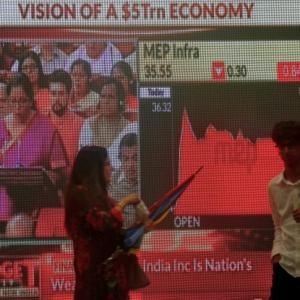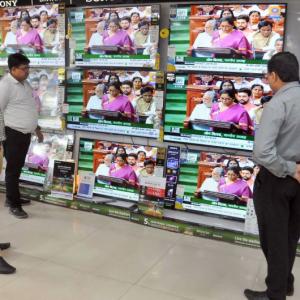'No Budget has so far has addressed the issue of the government's abysmal productivity of capital spending, improving which will be the big game changer.
'But, the government's tight lock on businesses, banks, education, and even essential services like transportation and large parts of infrastructure and healthcare is destroying capital year after year,' points out Debashis Basu.

The Union Budget has come and gone, as memorable or as forgettable as any other.
Like each year, industry lobbies sent memorandums on what they wanted from the Budget, businessmen publicised their wish list, while financial experts, analysts and fund managers hoped that a new government, armed with another huge majority in Parliament, would unleash "reforms".
Reforms, of course, have been in the process of arriving in India for the past 25 years, like Godot in Samuel Beckett's play.
Come Budget Day, we began the usual process of deciphering what the finance minister (FM) had offered by way of proposals, ideas, and tax changes.
But to what end? Let's take what market players were expecting and what they got.
Expectations ranged from a repeal of the long-term capital gains tax, to a bailout package for the tottering over-leveraged finance companies, to tweaking income-tax slabs, to greater privatisation.
What we got instead were regressive ideas such as a tax on share buyback and forced liquidation of promoter shareholding from 25 per cent (currently only on paper) to 35 per cent, which has been in the works for decades.
Many parts of the speech had little to do with the Union Budget.
They were policy announcements and motherhood statements could have been announced at any other time.
For instance, the FM announced Rs 70,000 crore capital infusion.
Remember, Arun Jaitley as FM announced the mega Rs 2.11 lakh crore bank recapitalisation in October 2017, far away from any Budget.
Some parts of the FM's speech were mere ideas.
Forcing promoters of listed companies to sell their shares down to 65 per cent or less is neither a spending nor resource-raising proposal.
In fact, it is not even a proposal of any kind.
It is merely a suggestion to the Securities and Exchange Board of India (Sebi)! Worse, the idea goes back to 2006, but despite Sebi giving a firm date, the deadlines have come and gone.
While the government has not bothered to bring down the stakes of public sector companies below 75 per cent, it is already doing loud thinking in a Budget speech to bring it down to 65 per cent!
More such ideas that have nothing to do with the Union Budget include a new education policy, public-private partnership for a faster development of passenger freight services, restructuring the National Highways Programme for creating the National Highways Grid, and "using rivers for cargo transport to decongest roads and railways", something that I have been hearing since 1985, a year after I came to journalism!
Then there is the "Rs 100 lakh crore" which is to be invested in the infrastructure sector over the next five years.
After throwing this big number, the FM said an "expert committee would be set up to recommend structure and flow of funds through development finance institutions (DFIs)".
Which institutions would these be? Indian DFIs have been phased out and converted into banks since the 1990s as part of a plan.
Except for specific changes in tax provisions (usually tax increases), poring over Budget pronouncements is meaningless.
After all, there will be too many deviations from what was said in the Budget and too many new policy initiatives announced later.
Also, with Narendra Modi as prime minister, it is he who plans, controls and executes various programmes (although not always with the best results).
After the Budget, in his customary manner, Mr Modi announced the Budget would make the nation samrudh (prosperous) and the people samarth (able).
A combative politician who is sensitive to criticism, he slammed those criticising the Budget as "professional pessimists".
In effect, he dismissed us with a characteristic sound bite and will now go on to do what he wishes.
This is the key.
We need to pay attention to what this regime does rather than what it says.
Every Union Budget is an exercise in hiding bad government finances in various ways.
This government is so brazen that the FM simply did not bother to mention the fiscal deficit, which is something that economists discuss ad nauseam.
The other important objective of the Budget is to discuss how much more money the government will raise next year.
This takes the form of extortive taxes on people and on the most productive part of the system, the enterprises.
This relentless resource-grabbing is needed to keep the least productive part of the system -- the government -- going.
Taxes also allow politicians to distribute largesse to their pet socialist schemes, which they think will win elections.
No Budget has so far has addressed the issue of the government's abysmal productivity of capital spending, improving which will be the big game changer.
But, the government's tight lock on businesses, banks, education, and even essential services like transportation and large parts of infrastructure and healthcare is destroying capital year after year.
This is why more and more resources have to be extorted from people, choking off consumer demand and business spending, which could generate growth and create jobs.
We ought to see through this continuous extortion, and start protesting against it some time.
And yet, year after year, the smartest people accept this inefficient structure, the elephant in the room, as a given, and expect significant changes to come about through mere tinkering.
There is a saying, "Fool me once, shame on you; fool me twice, shame on me."
Here, we are fooling us over and over again!
Debashis Basu is the editor of www.moneylife.in.










